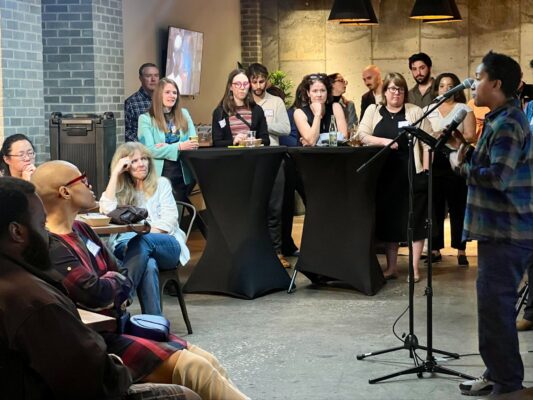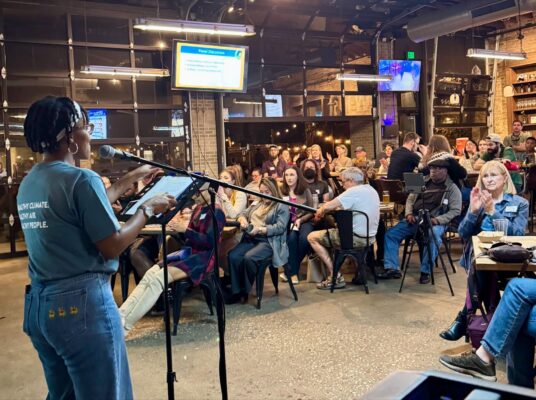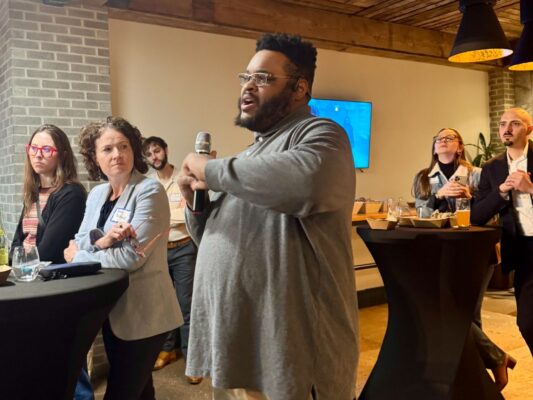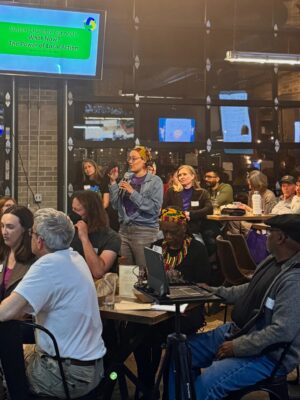Sustain Charlotte Connects: What now? The power of local action
“Local action is NOT small action!” was the resounding message at Tuesday evening’s first Sustain Charlotte Connects networking and educational event of 2025.
Can we still make a difference by advocating to our local elected officials despite executive orders, federal funding freezes, and the gutting of key government departments?
Our panel of committed and knowledgeable advocates shared many ways that local advocacy has improved the quality of life for residents, supported a healthy environment for all, and elevated the voices of residents whose needs have been overlooked in the past.

Tonya Jameson shared that the organization where she works, Leading on Opportunity, was created to identify and address the reasons that Charlotte ranked 50th out of the 50 largest U.S. cities for upward economic mobility in a 2014 study. Charlotte has recently improved to now rank 38th, but there is still much room for improvement. Jameson said that childcare and social capital are the strongest tools for improving economic opportunity, as well as other factors in the category of “child and family stability”, which also includes affordable and fast transportation.

Kennedy Williams, Community Engagement Coordinator at CleanAIRE NC, shared how residents and other nonprofit organizations united to advocate for the successful City Council adoption of Charlotte’s first climate action plan, the Strategic Energy Action Plan (SEAP). The SEAP passed during the first administration of our current president at a time when climate change was deprioritized nationally, which is strong evidence that the commitment of residents, elected officials, and government staff at the local level can overcome a lack of support for sustainability issues at the local level.
Joi Mayo, a leader of Transforming Nations Ford, explained that residents and small business owners are concerned about the environmental, social, and economic impacts of the planned widening of Interstate 77 South from I-277 to the SC state line. They are asking the project consultant to deepen the community engagement process and ensure that all voices are heard as a proposal for potential developers is created. Mayo and her team are building partnerships with other neighborhood organizations along the I-77 S corridor while doing their own outreach to increase attendance at an upcoming public meeting.
Certainly, the growing lack of federal funding and policy support for critical initiatives including environmental justice, climate resilience, and DEI creates a much more challenging situation for those of us who care about a more sustainable future for the Charlotte area. But as our partners continue to work at the state and federal levels, we don’t want to lose sight of how powerful local advocacy can be! We shared examples of how Sustain Charlotte and thousands of residents have driven real change over the years including ambitious City and State transportation budgets, adoption of a citywide Vision Zero goal to end traffic fatalities and serious injuries, and land use policies for walkable neighborhoods and abundant housing.

The event concluded with an opportunity for the audience to ask questions of the panelists, followed by networking social time.

Thanks for reading!
As a nonprofit, community support is essential for us to keep doing what we do — including providing free articles like this. If you found this article helpful, please consider supporting Sustain Charlotte.
Want to stay in the loop? Subscribe to our weekly newsletter and follow us on Instagram, Facebook, and X.
